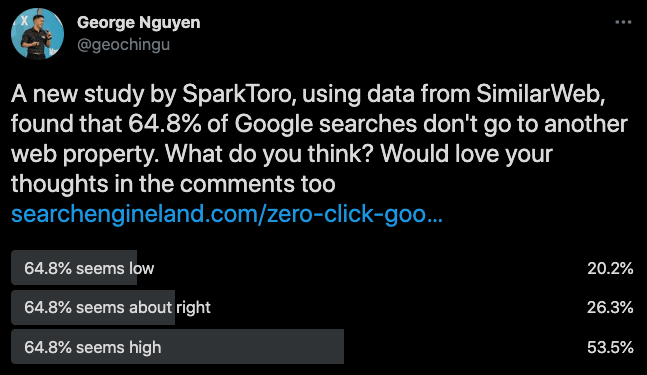FLoC testing hits a snag in Europe; Wednesday’s daily brief
And, which is more difficult for brands, being authentic or conveying authenticity?
Search Engine Land’s daily brief features daily insights, news, tips, and essential bits of wisdom for today’s search marketer. If you would like to read this before the rest of the internet does, sign up here to get it delivered to your inbox daily.
Good morning, Marketers, maybe you can help me understand something.
We preach authenticity as the foundation of our messaging, and it comes from understanding our audiences’ needs. But, major brands make the news all the time for getting it wrong. So, is it just more difficult for larger organizations? And shouldn’t larger organizations also have the means to get everyone on the same page?
Here’s an example from my upcoming keynote with Carolyn at SMX Create: On June 2, 2020, Taco Bell made an Instagram post stating that it doesn’t tolerate racism or violence against Black people. Just over two weeks later, a viral video was released in which an employee was fired for wearing a Black Lives Matter mask. What was the disconnect here? There’s usually an apology, but there’s rarely an explanation, and it’s even rarer that the explanation undoes the sense of betrayal.
Then, there are less obvious contradictions: Nearly a year ago, Google pledged to disburse $340 million in Google Ads credits to SMBs in an effort to support businesses impacted by the pandemic. Not six months later, it notified advertisers in the U.K., Austria and Turkey that it would be passing on digital service taxes, which were levied on Google by regulators, directly to advertisers. The pandemic didn’t end in those countries, so what kind of message were advertisers supposed to receive? It’s a weird set of decisions — Amazon also passed on the tax to advertisers, but Amazon didn’t come out in support of SMBs, so is Google somehow more disdainful for having tried?
Customers are more informed than ever, so understanding how these contradictions occur might help us structure our organization and communications to avoid them. Let me know your thoughts, send me an email at [email protected].
George Nguyen,
Editor
Google’s current FLoC tests aren’t GDPR compliant
Without consent, a browser assigning a user into a cohort could count as a use of personal data, and would be a violation of European privacy law. This is the assertion that is preventing Google from testing out FLoC with advertisers in Europe, as it will be doing with domestic advertisers in Q2.
Google is walking a thin line between advertising capabilities for its customers and increased privacy for users, although the latter has been under fire by privacy advocates for a number of reasons, some of which we discussed in our article FLoC is coming — Here’s what we know so far.
This development leaves many questions unanswered: If regulators in Europe speak out against FLoC, will it cause other countries to do the same? And, will Google develop another third-party cookie alternative specifically for Europe? We’ll keep you updated as we find out more.
YouTube experiments with automated lists of products detected in videos

Video-related automation has come a long way — remember when captions weren’t automatically generated? Now, Google is testing out automated lists of products based on what it detects in a given video. These lists, which may also contain related products, will appear below the video player, in between video recommendations. Whether they’re watching a video from a manufacturer or a content creator, this might help usher viewers along their customer journey.
This experiment will only be available for a limited time and only to viewers in the U.S.; and, it’s part of the commerce experiments for YouTube that Google announced last month. The company didn’t tell us what the lists will link to, but it’ll allow viewers to “make informed purchases directly on YouTube,” according to the announcement.
The company is also testing a new way to watch YouTube videos directly within the Twitter iOS app. If this rolls out more widely, it may help content creators get more views and, as a result, further their branding, since users won’t have to interrupt what they were doing to view a video.
More than half of SEOs think 65% is too high

SimilarWeb’s study on zero-click searches, which we published on Monday, raised a lot of eyebrows. And, according to my highly scientific Twitter poll, the majority of SEOs think that 65% of searches ending without a click to another web property seems too high.
There’s a lot to think about here, such as the nature of the queries. Many were quick to point out that users don’t always want to click through to a site, especially for searches like “weather in Tokyo.” Rand Fishkin, who published the study, clarified that the data did not attempt to classify or exclude queries. Does that mean this statistic should be less of a consideration for marketers? After all, we’re not looking to drive traffic from all queries — just the ones that are relevant to our businesses.
Even without these kinds of studies, it’s easy to see that the number of rich results, ads and Google products that populate the results page often make users feel less compelled to click on organic listings. JH Scherck brought up an interesting point: “A decade ago, it was *very* possible to use search to acquire customers and build a brand, fast forward 10 years, and being a brand is now a prerequisite to compete.” Creating demand for your brand is incredibly important, especially since we’re often at the mercy of the platforms we rely on for traffic.
I have one lingering question about all this: SimilarWeb’s data says that 46.5% of desktop searches were zero-click, compared to 77.2% on mobile devices. As we become more mobile, thanks to vaccine rollouts, how high will the overall zero-click stat go?
Fewer people trust online reviews (and 3 other review trends to watch)
Online reviews have a crucial impact on small businesses. Proactive online reputation management builds trust with potential and returning customers. Plus, reviews help your visibility in local search. Joy Hawkins gives us the latest trends to watch in local reviews:
- More users are leaving 1- and 5-star reviews and fewer are leaving 2 and 3 stars.
- Fewer people report that they “trust reviews as much as personal recommendations.”
- Fake reviews are on the rise.
- Reviews decreased last year due to COVID-19.
Why we care. As reviews continue to be a huge influencer of online purchasing behavior, it’s crucial to know how the various platforms are combatting the issues with fake reviews and how consumers are responding. With reviews still believed to be a local SEO ranking factor, it’s important for businesses to not ignore the weight that reviews still have in the local pack–even if customer sentiment regarding reviews is shifting, especially with the pandemic.
Hospitals are noindexing pricing pages because of course they are

There’s a federal rule that states hospitals must publish their prices. Making those price pages available in search engines’ results, apparently, is not part of that rule. So hospitals owned by HCA Healthcare Inc., Universal Health Services Inc., the University of Pennsylvania Health System and NYU Langone Health, among many others, have noindexed that content, according to the Wall Street Journal.
In response to the Journal’s questions, some hospitals have said that they’re not trying to hide the information, instead, they’re trying to direct patients to “information they considered more useful than raw pricing data.” Other hospitals have said it was an error and have since made the prices indexable.
This reminds me of last year when the IRS required online tax return software companies to index their Free File landing pages. Whether intentional or not, noindexed price pages make that information more difficult to locate, and I think it’s safe to assume that if you’re looking up hospital rates, you’re probably price-sensitive. Companies aren’t going to change, so instead, regulators need to contextualize the availability of information with regard to search and explicitly mandate that such information be made available on a company’s site and discoverable via search engines.
Contributing authors are invited to create content for Search Engine Land and are chosen for their expertise and contribution to the search community. Our contributors work under the oversight of the editorial staff and contributions are checked for quality and relevance to our readers. Search Engine Land is owned by Semrush. Contributor was not asked to make any direct or indirect mentions of Semrush. The opinions they express are their own.


